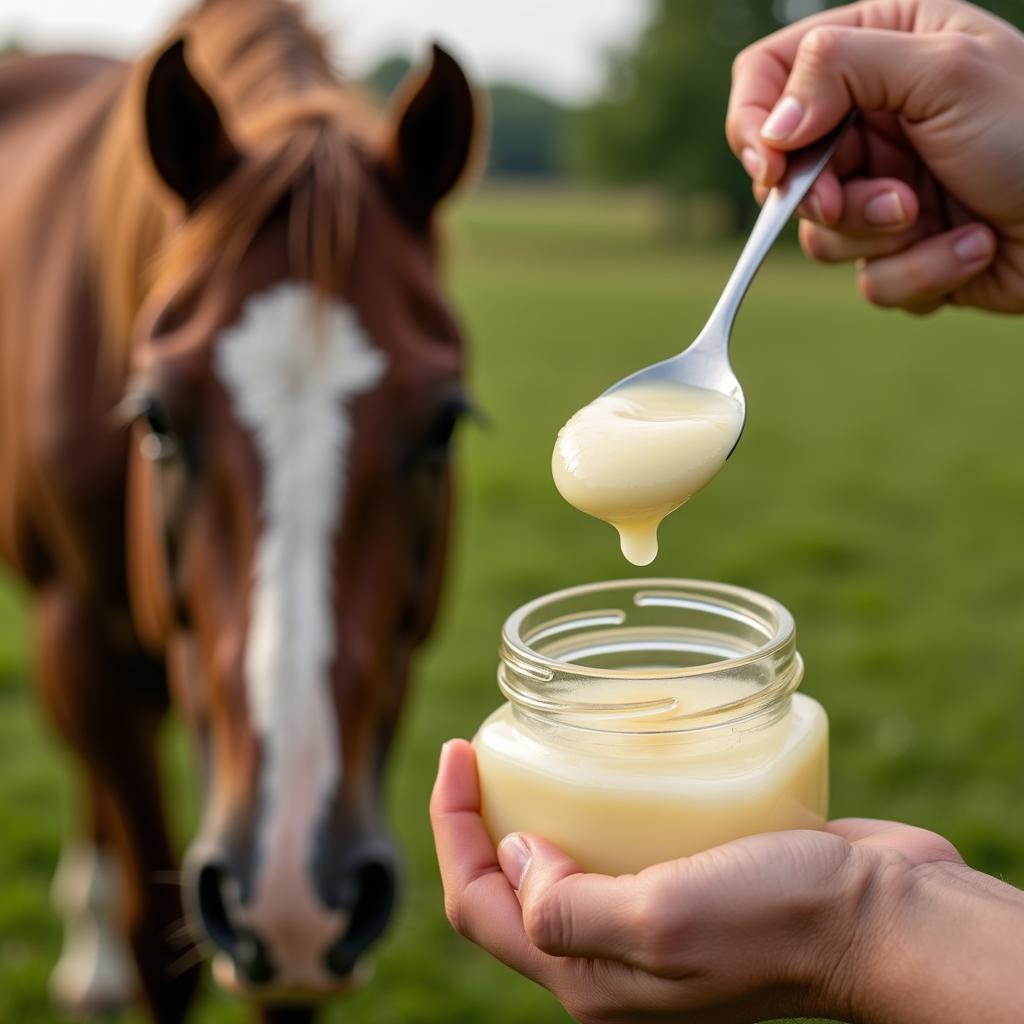Coconut oil has become increasingly popular for both human and animal consumption in recent years, and it’s no surprise that many horse owners are wondering if it can benefit their equine companions too. But is coconut oil truly good for horses, or is it just another passing fad? Let’s delve into the facts and explore the potential benefits and drawbacks of incorporating coconut oil into your horse’s diet.
 Coconut Oil Benefits for Horses
Coconut Oil Benefits for Horses
Understanding Coconut Oil and Its Composition
Coconut oil is a highly saturated fat extracted from the meat of mature coconuts. It’s composed primarily of medium-chain fatty acids (MCFAs), including lauric acid, which possesses antimicrobial and antiviral properties. These unique properties have led many to believe in coconut oil’s potential health benefits.
Potential Benefits of Coconut Oil for Horses
While research specifically on horses is limited, anecdotal evidence and studies on other animals suggest that coconut oil might offer several advantages:
- Improved Skin and Coat Health: Coconut oil is known for its moisturizing and conditioning properties, which could benefit horses with dry skin, rain rot, or dull coats.
- Enhanced Digestion and Nutrient Absorption: The MCFAs in coconut oil are believed to be easily digested and absorbed, potentially aiding in nutrient utilization.
- Boosting Energy Levels: Some proponents suggest that coconut oil can provide a quick source of energy, particularly for performance horses.
- Supporting Immune Function: Lauric acid’s antimicrobial properties might contribute to a healthier immune system.
- Natural Fly Repellent: The scent of coconut oil is said to deter flies and other insects, offering a natural alternative to chemical repellents.
 Shiny Horse Coat After Coconut Oil Treatment
Shiny Horse Coat After Coconut Oil Treatment
How to Feed Coconut Oil to Horses
If you decide to incorporate coconut oil into your horse’s diet, moderation is key. Start with small amounts (1-2 tablespoons) and gradually increase the dosage as needed. You can mix it with your horse’s regular feed or offer it separately.
Here are some ways to feed coconut oil to your horse:
- Mixed with Feed: Add melted coconut oil to your horse’s grain or pelleted feed.
- Top Dressing: Pour melted coconut oil over hay or chopped vegetables.
- As a Treat: Offer a small amount of solidified coconut oil as an occasional treat.
Always introduce new foods gradually to your horse’s diet, monitoring for any signs of digestive upset or allergic reactions.
Precautions and Considerations
While coconut oil appears generally safe for horses, it’s essential to exercise caution:
- Potential for Weight Gain: Coconut oil is calorie-dense, so overfeeding could lead to unwanted weight gain.
- Digestive Upset: Introducing coconut oil too quickly or in large quantities might cause diarrhea or loose stools.
- Individual Sensitivities: Some horses might be allergic or intolerant to coconut oil.
natural mosquito repellent for horses
Consulting Your Veterinarian
Before adding any new supplements or making significant changes to your horse’s diet, it’s crucial to consult your veterinarian. They can help you determine the appropriate dosage, consider potential interactions with any existing medications, and address any concerns specific to your horse’s health and needs.
 Veterinarian Examining a Horse for Dietary Needs
Veterinarian Examining a Horse for Dietary Needs
Conclusion
While more research is needed to confirm the specific benefits of coconut oil for horses, anecdotal evidence and its known properties suggest it might offer some advantages when used appropriately. Remember to start slowly, monitor your horse’s response, and always consult your veterinarian for personalized advice. With careful consideration and a cautious approach, coconut oil could potentially become a beneficial addition to your horse’s care regimen.
FAQs About Coconut Oil for Horses
1. Can I apply coconut oil directly to my horse’s skin?
Yes, coconut oil can be applied topically to soothe dry skin, treat minor wounds, and improve coat shine.
2. Is coconut oil safe for horses with metabolic issues?
Consult your veterinarian before feeding coconut oil to horses with metabolic conditions as it is high in fat.
3. How much coconut oil is too much for a horse?
Start with small amounts (1-2 tablespoons) and gradually increase to a maximum of 1/2 cup per day for an average-sized horse, always under veterinary guidance.
4. Can coconut oil help with insect control?
Some horse owners find that the scent of coconut oil deters flies and other insects.
5. Where can I purchase coconut oil suitable for horses?
Look for organic, virgin coconut oil from reputable brands at feed stores, tack shops, or online retailers.
6. Can I use coconut oil as a hoof conditioner for my horse?
Yes, coconut oil can help moisturize and condition dry hooves. Apply it to the hoof wall and sole after cleaning.
7. Is coconut oil a replacement for my horse’s regular diet?
No, coconut oil should not replace your horse’s balanced diet. It should be considered a supplement or treat.
Looking for more horse care tips?
Check out our article on shampoo horse mane for expert advice on maintaining your horse’s beautiful mane.
Need further assistance? Contact us at Phone Number: 0772127271, Email: [email protected] Or visit us at: QGM2+WX2, Vị Trung, Vị Thuỷ, Hậu Giang, Việt Nam. Our customer support team is available 24/7 to assist you.